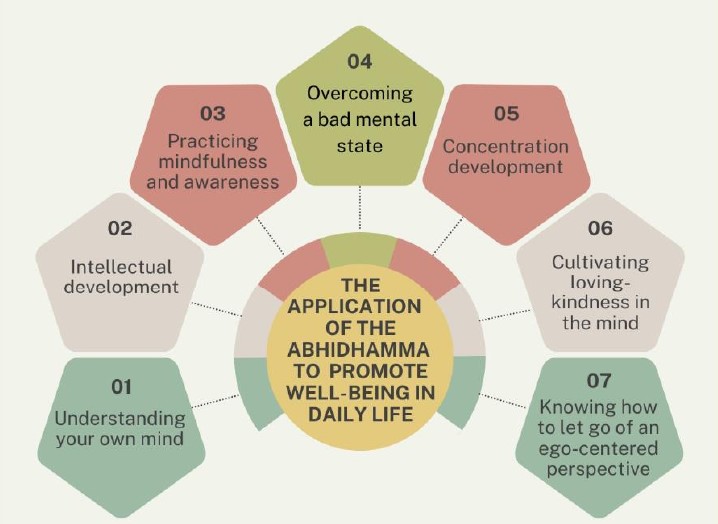THE APPLICATION OF THE ABHIDHAMMA TO PROMOTE WELL-BEING IN DAILY LIFE
Keywords:
The Abhidhamma Principles, Well-Being, Daily LifeAbstract
Background and Objectives: Nowadays, the world has changed in various aspects. Communication across borders and development in science and technology have made changes in people's past lifestyles with higher material value, leading to taking advantage of each other and focusing on self-interest rather than the benefit of others. When society becomes like this, a person's morality has deteriorated, causing a state of balance both mentally and materially, and problems in society such as corruption and crime. In Buddhism, a happy society is seen as a state of being free from oppression or violence and living together without suffering. Abhidhamma principles emphasize education and development of the physical, mental, social, and intellectual aspects in order to have good health at the individual level, national level, and global society. It starts with the mind as the driving force to be a complete human being and able to live happily in global society. The purposes of this article are studying guidelines for applying the Abhidhamma principles that create good health in everyday life, and presenting guidelines for applying the Abhidhamma principles that create good health in everyday life.
Methodology: This qualitative research analyzed data from documents and from the study of the Abhidhamma. The research tool is a classroom discussion model, knowledge management, and lessons learned.
Main Results: The results comprised: 1) Guidelines for applying Abhidhamma principles to create good health in everyday life indicated that the principles of Abhidhamma had the strengths of education in order to develop one into a complete human being in both physical and mental aspects, consisting of; 1.1) Understanding the development of a healthy society in the current Thai social context with the principles Abhidhamma, 1.2) Application of Abhidhamma principles in Tikmātika concerning Kusala-dhamma, Akusala-dhamma, and Abyākata-dhamma; One should have set their mind to only doing good deeds by giving alms, keeping the precepts, and practicing meditation because good deed is a Dhamma that should have been greatly developed as it led to happiness, not behaving in unwholesome manner because it was a Dhamma that should have been avoided as it led to suffering, and 2) Suggestions for applying the principles of Abhidhamma to create good health in daily life consisted of integrating Abhidhamma principles to enhance physical and mental health, doing health-promoting activities such as practicing Dhamma exercise, meditation because of stress and anxiety born from our thoughts and composed of various events with our imagination.
Involvement to Buddhadhamma: The application of Abhidhamma principles is a process of studying and developing various human behaviors. The main aim is to create good health in everyday life with principles aimed at developing human perfection in the physical, mental, social, and intellectual aspects and creating a healthy society to live happily together in a global society.
Conclusions: The principles of Abhidhamma were considered to be a valuable source of ultimate knowledge in enhancing well-being and living healthy in daily life. The author studied and summarized it as a body of knowledge that led to physical, mental, social, and intellectual development, helped enhance physical and mental health, reduced stress and anxiety, and increased good relationships with others. It was a guideline for developing individuals into complete human beings living in peace in a global society.
References
Buddhadasa Bhikkhu. (2008). Applied Buddhism. Dhammathan Foundation.
Chaisuwan, W. (2020). Abhidhamma, Who Says It's Difficult? Volume 1. Foundation for the Propagation of the True Dhamma.
Ketsriphong, O. (2007). Sangkhahavatthu 4 organizational cultures that are conducive to knowledge management. Journal Productivity World for increasing productivity, 12(68), 43-46.
Mahachulalongkornrajavidyalaya University. (1996). Thai Tripitaka. Bangkok: Mahachulalongkornraja.
Mahamakut Rajavidyalaya University. (1990). Abhidhamma Pitaka, Volume 1, Part 1, Dhammasangani and Commentary, published in 200th Anniversary of the Chakri Dynasty
Rattanakosin, B.E. 2525 (vidyalaya edition). Theater Pim Mahamakut Rajavidyalaya.
Methangkun, B. & Methangkun, B. (1978). study guide Abhidhammadhammatha sangaha, Part 1, Section 1 Chittapramat. Sutthisan Printing House.
National Health Commission Office (NHCO). (2007). National Health Act 2007. National Health Commission Office (NHCO).
Peykaeo, R., Phra Kittipong, Phra Kamolrat Taileelais & Pandee, P. (2022). The Mental Development in Abhidhamma Pitaka Course. MBU Humanities Academic Journalc, 14(1), 15-34.
Phrapalad Wisut Kuttachayo. (2022). A study manual for the Abhidhamma at the Chula Abhidhammikatri level (10th ed.). V. Inter Print Company Limited.
Phra Phromkhunaporn (P.A. Payutto). (2008). “Buddhist Holistic Wellness” (6th ed). Saha Printing and Publishing Company.
Phra Saddhammachoti Dhammacariya. (1993). Matikachotika Dhammasaṅgaṇīsarūpaṭṭhanissaya (Chula Aphidhamika level curriculum Ek) (10th ed.). Bangkok Medical Publishing House.
Phra Sri Pariyatimoli. (2000). Youth's morality begins at home. Journal of Sekhiyadham, 10(44), 38-47.
Somdej Phra Buddhakosajarn (P.A. Payututo). (2018). Dictionary of Science. Glossary edition (7th ed.). Mahachulalongkornrajavidyalaya Printing House.
Vijittammo, P. & Thitiyano, P. (2018). An Analytical Study of the Abhidhamma Interpretation of Thera in Buddhism. Journal of MCU Humanities Review, 1(1), 45-58.

Downloads
Published
How to Cite
Issue
Section
License
Copyright (c) 2023 Journal of Buddhist Anthropology

This work is licensed under a Creative Commons Attribution-NonCommercial-NoDerivatives 4.0 International License.








